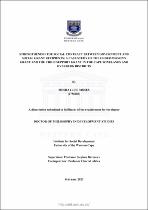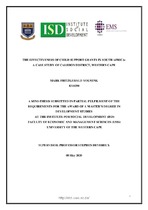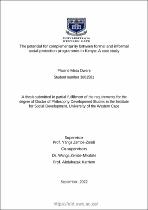| dc.description.abstract | Since the birth of democracy in 1994, the South African government has struggled to substantially address the social and economic inequality as well as widespread poverty produced by the apartheid system. Social assistance, particularly in the form of direct cash transfers, is one of the instruments used by the current government to alleviate poverty and economic vulnerability because it enables households to access cash or increase expenditure on material and non-material resources such as food, clothes, education, and health care. Social assistance is a powerful tool to build communities and strengthen their involvement in the overall democratic process. This gives effect to the Bill of Rights in the Constitution, which guarantees everyone in South Africa the right to access social security, including, if they are unable to support themselves and their dependants, appropriate social assistance. This right, together with the relevant legislation, places a responsibility on government to be accountable for the administration and delivery of social grants.
This study investigates the experiences and perceptions of the recipients of the Older Person’s Grant (OPG) and the Child Support Grant (CSG) towards the social grant system in South Africa. It uses social contract theory as an analytical framework to explore whether the government is delivering on its constitutional obligation. The research focuses on the perspectives of recipients who are receiving the OPG and the CSG. The researcher undertook an in-depth study in the Cape Winelands and Overberg Districts in the Western Cape Province. This study adopted a qualitative methodological approach to investigate how grant recipients from different racial identities within the aforementioned districts understand the relationship between government and citizens in relation to social assistance. It also explores how the relationship between the government and social grant recipients can be sustained and strengthened in the future. | en_US |




